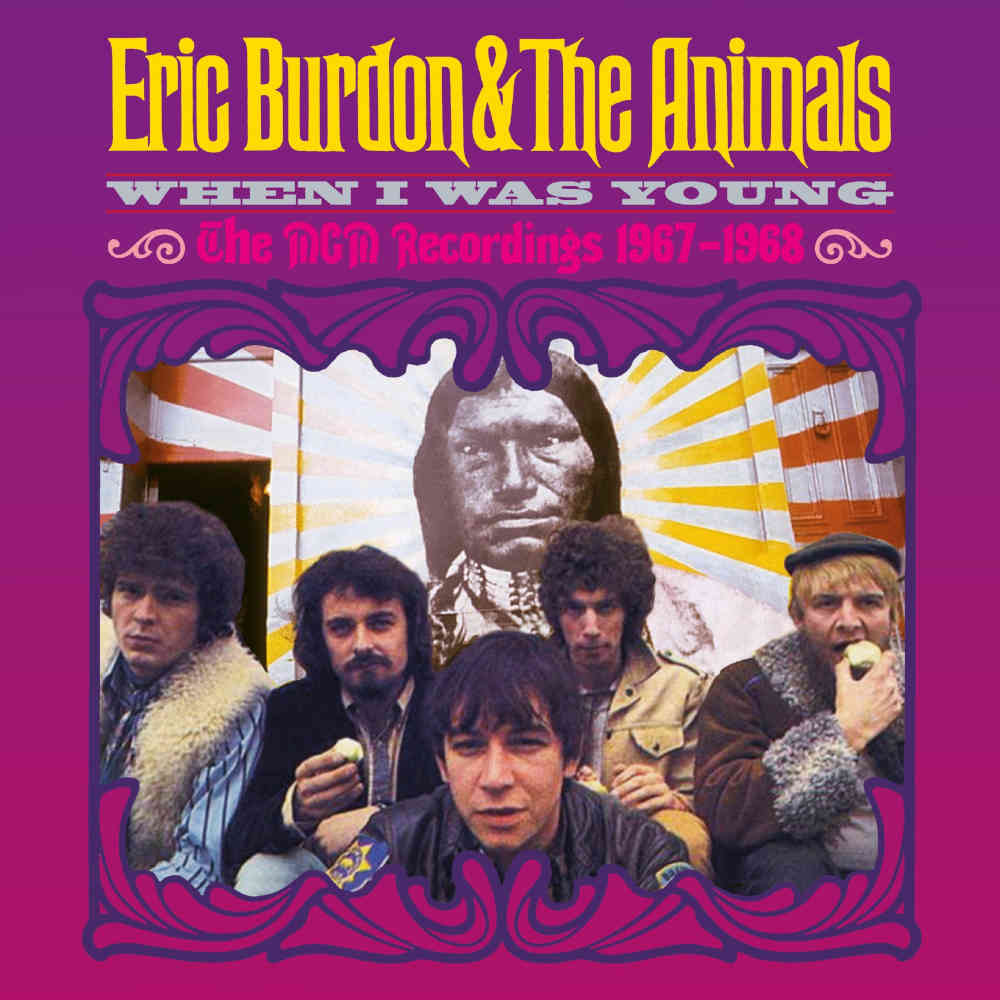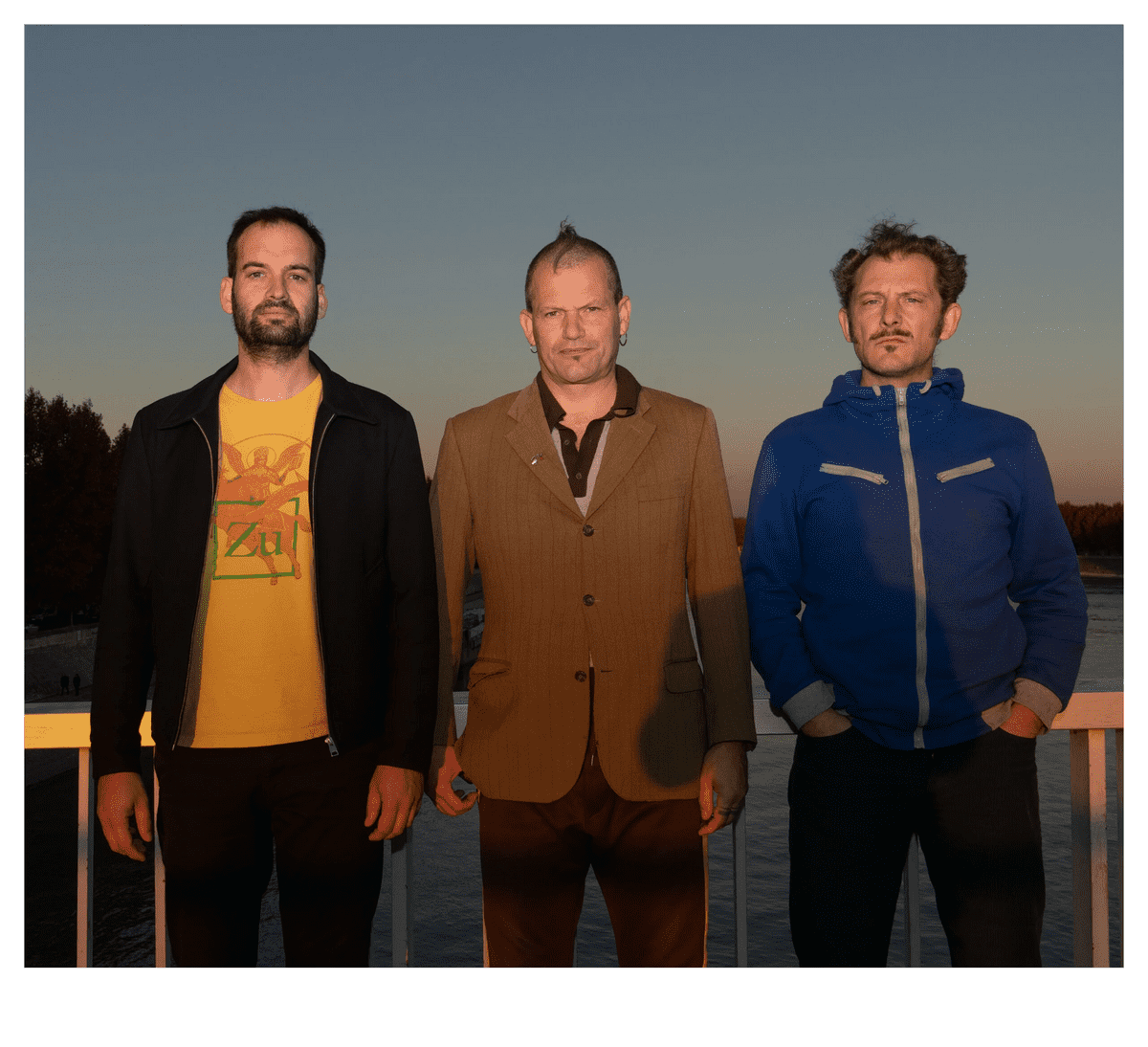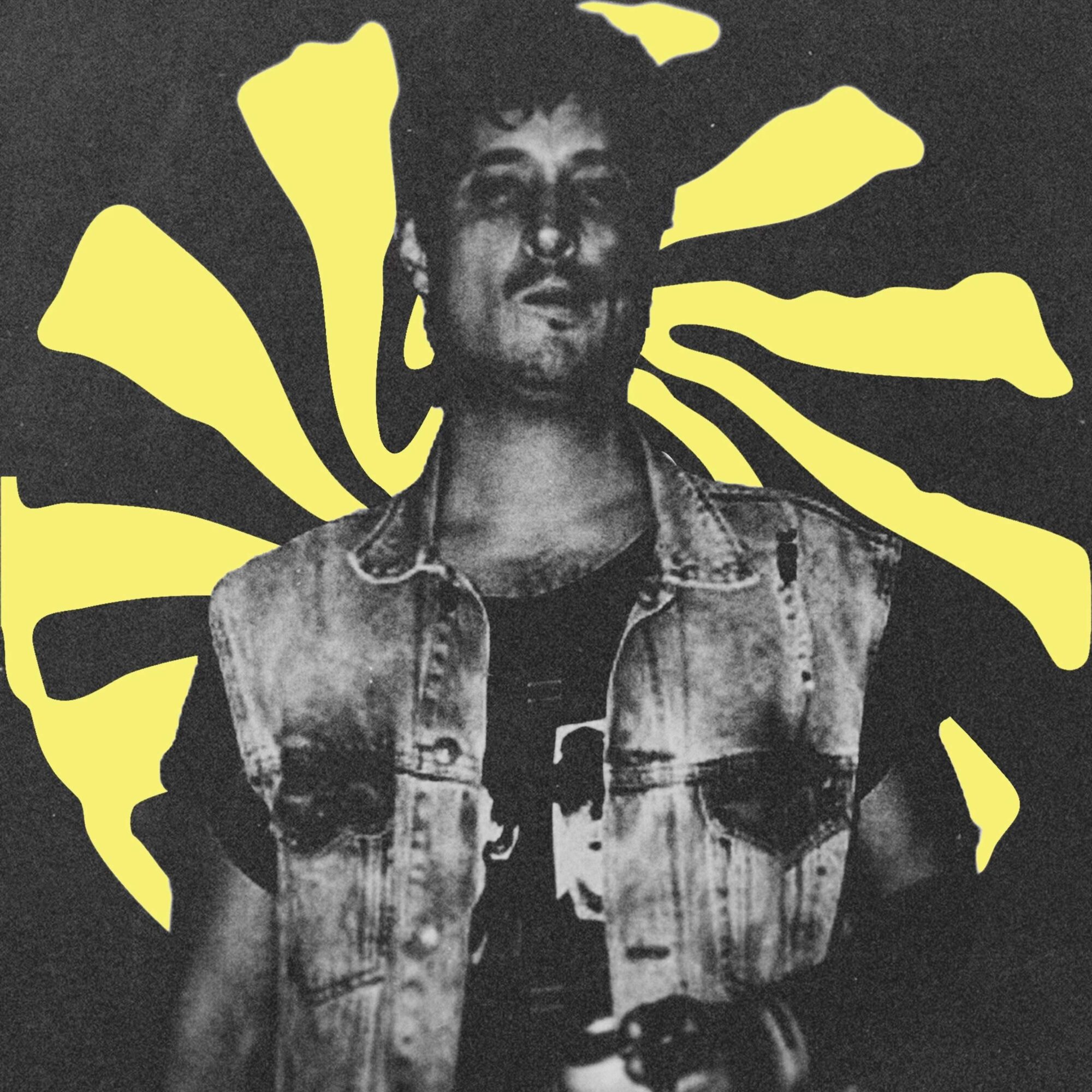Eric Burdon & The Animals – ‘When I Was Young-The MGM Recordings 1967-1968’ (2020)
Following the breakup of the original Animals, Eric Burdon & The Animals came together in December, 1966. The new lineup consisted of vocalist Burdon, guitarist/pianist Vic Briggs, guitarist/violinist/bassist John Wieder, bassist Danny McCulloch and drummer Barry Jenkins as the band moved away from its familiar raucous rhythm and blues sound to psychedelic rock and its accompanying counter culture influences.
The band signed to MGM Records, became based in the USA, releasing four albums, one a double LP, and a string of singles between October 1967 and December 1968. Esoteric Recordings has gathered the four albums, one presented in both mono and stereo, and added ten bonus tracks taken from singles in this impressive new five disc box set.
Disc one centers around a newly re-mastered version of the stereo mix of the band’s debut ‘Winds Of Change.’ The album was dedicated to George Harrison and contained an answer to Jimi Hendrix’s yet unreleased musical question “Are You Experienced?” The album’s four minute opener is trippy folk psych rocker with sound effects, featuring deeply echoed guitar and spoken word vocals. ‘Poem By The Sea’ is another gentle, trippy number with Briggs’ instrumental work to the fore. The only tune on the LP not credited to the entire group is a six minute cover of The Rolling Stones’ ‘Paint It Black’ which was recorded and released by producer Tom Wilson against the band’s wishes although over time it has come to be closely related to Burdon, who used it as the centerpiece of ‘Black Man’s Burdon’ a double album the vocalist released after dissolving The Animals and joining forces with the American band War. The track found here is a soulful take with an intro featuring Briggs’ acoustic guitar and Wieder’s violin. ‘The Black Plague’ has a baroquian intro and dark, spoken word vocals. The moody piece also features gentle guitar and percussion contributions. The album’s first rocker is ‘Yes I Am Experienced’ Burdon’s response to Hendrix’s musical question apparently regarding the usage of psychedelic drugs. Featuring more spoken word vocals from Burdon, the tune changes tempo mid-tune with Briggs’ fiery guitar leading the way. ‘San Franciscan Nights’ employs a musical reverse from the prior tune, moving effortlessly from its heavy electric intro to a gentler, folkish acoustic tempo with Burdon supplying hip spoken word vocals referencing Love Street and the hippie scene then central to San Francisco and its music scene. The tune, when released as a single topped out at #7 in the UK and #9 in the US. ‘Man-Woman’ is a five and a half minute tune built around Jenkins’ percussion and Burdon’s hip rap regarding drug influenced nights with stabbing guitar courtesy of Briggs adding texture. Burdon delivers more social commentary with the delicate jazz rock tinged ‘Hotel Hill.’ Burdon’s ode to self indulgence ‘Good Times’ features the repeated refrain “when I think of all the good time that’s been wasted having good times.” ‘Anything’ is more social commentary from Burdon with a gentle, acoustic intro and gorgeous melody. The album closes with ‘It’s All Meat’ a two minute driving rocker, featuring hot lead guitar from Briggs and Burdon name dropping people such as Eric Clapton and Muhammed Ali throughout, with Briggs’ solo especially notable. The disc is rounded out by five single sides. First up are both sides of the May, 1967 single whose a-side serves as the title track to this set. ‘When I Was Young’ rocks from its feedback laden intro through its guitar driven melody with Burdon supplying social commentary, speaking of race relations well before it was acceptable let alone hip. Briggs supplies yet another tasty guitar solo which plays the song out. The single hit #40 in the UK, but fared much better in the US where it reached #15. The b-side is the acid drenched rocker ‘A Girl Named Sandoz’, Burdon’s tribute to the Swiss manufacturer of LSD. Three b-sides close out the disc, beginning with ‘Ain’t That So’ a pop rocker featuring fuzzed out guitar and a killer echoed solo by Briggs. ‘Gratefully Dead’ follows suit with its heavy groove and guitar, and a tasty false stop added for good measure. The final track is an edited version of ‘Anything’ ending the disc on a gentle note.

Disc two is built around May, 1968’s ‘The Twain Shall Meet’ which features two of the biggest selling singles from this period, and is filled with anti-war social commentary. The album opens with the familiar ‘Monterey’ Burdon’s documentation of the 1967 pop festival. The tune’s acoustic intro flows effortlessly into electric mode with trumpet added for texture. Burdon name drops throughout the tune, mentioning The Byrds, The Airplane, The Who, Hendrix and Brian Jones of The Rolling Stones among others. The festival is immortalized by Burdon’s observation of “ten thousand electric guitars were groovin’ real loud” and his sublime quip “I think maybe I’m dreaming.” The song is an absolutely perfect single and marker for a place and time. The mid-tempo ballad ‘Just The Thought’ has a Moody Blues feel to it. ‘Closer To The Truth’ is a bluesy number, the band settling into a comfortable groove with crashing lead guitar courtesy of Briggs. ‘No Self Pity’ is a mid-tempo track given an exotic feel by harpsichord with Burdon adding introspective lyrics. ‘Orange And Red Beans’ features a gentle, keyboard driven melody with horns added for accent. The album’s other hit is the seven and a half minute plus magnum opus ‘Sky Pilot’ released as a two-sided single. The song’s spoken intro gives way to phased guitar as Burdon comments on the brutality of the war in Vietnam as seen through the eyes of a chaplain, a creative notion indeed. Briggs contributes a memorable guitar solo as sound effects of the war mesh with the band’s groove before bagpipes enter to add to the dramatic texture. At the five minute mark acoustic guitar and strings bring Burdon’s vocals back to the fore with flute and vocal harmonies adding accent. ‘We Love You Lil’ opens with acoustic guitar and bouncing beat before Briggs’ lead guitar and solo change the tempo, his guitar playing over the top of the gentle melody, a most gorgeous tune indeed. ‘All For One’ closes the album, its bagpipe intro supplying another change of pace before Briggs’ guitar enters followed by bass and drums. The song features more social commentary from Burdon, the lilting melody joined by his call for unity. The pace quickens as the bass races, yet Briggs’ guitar remains restrained. A horn interlude with strings added leads back to Burdon speaking the song and album to a relaxed, melodic, Moody Blues style finish. The disc is rounded out by the two-part stereo single version of ‘Sky Pilot’ which stalled at #40 in the UK, but reached #14 in the UK, and a most interesting mono single version of ‘Monterey’ which peaked at #15 on the US charts while being unreleased as a single in the UK.
Disc three opens with the seven tracks that comprised August 1968’s ‘Every One Of Us.’ The album’s opener is the folk teetering on country rock tune ‘White Houses’ which is dominated by Burdon’s repeated pleas that “you better get straight” a reminder of the excesses of the day and is dominated by Briggs’ guitar work, the band having expanded to a sextet at this point with Zoot Money joining the ranks, performing under the name George Bruno for legal reasons, and contributing Hammond organ, piano and vocals. The LP itself was not released in the UK for reasons known only by the label and unlike its predecessors had no hit singles, composed as it was by longer, less commercial tunes. ‘Uppers And Downers’ is a short diddy, under thirty seconds, a bit of pure folly for the band. ‘Serenade To A Sweet Lady’ is a six minute beauty, written by Briggs for his then girlfriend, later to be wife, and is dominated by layered acoustic and electric guitars, with Briggs’ solo playing the song out. ‘The Immigrant Lad’ is another six minute piece, a sentimental, introspective tune dealing with life working in coal mines, a subject apt in both the US and UK, more social commentary compliments of Burdon. ‘Year Of The Guru’ is a rocker, reminiscent of Tom Petty with Dylan influences. Heavy guitar and thundering bass dominate the melody along with Money’s keyboards. Briggs and Money solo on guitar and piano, giving the song a wonderful jazz rock feel. The hottest rocker on the album, the tune shines brightly. A real change of pace, the band offers its take on the traditional blues number ‘St. James Infirmary’ the song showcasing the folk side of the group before Briggs steps up and solos the song out accompanied by Money’s piano. The album is dominated by the nineteen minute closer, the Burdon/Money composition ‘New York 1963-America 1968’ a biting piece of social commentary which focuses on Greenwich Village with its Tom Paxton style talking blues. Briggs’ infectious acoustic guitar dominates the tune’s opening before giving way to a conversation with a black fighter pilot who says $250,000 was spent training him only for him to be turned away from going to combat because of his race. He continues to talk about areas of the city where police and ambulances simply ignore calls, summing it up with “do something or there won’t be anything to do.” Gentle electric guitar and drums join the spoken words as Burdon again proves to be a master of commentary. Money’s organ and Briggs’ guitar come to dominate the tune, as Briggs’ swirling guitar solos away with the band locked into a comfortable groove. The tempo quickens as Danny McCulloch’s bass runs wild with Burdon commenting “freedom is a good thing’ while lamenting “you will never be free.” While some may find the song a bit self indulgent, looking at the world in 2020 Burdon appears prescient. The disc closes with the single version of ‘White Houses’ released as the a-side of a November, 1968 single which sadly failed to chart in either the US or UK.
Disc four contains the last album released by Eric Burdon & The Animals, December, 1968’s ‘Love Is’ which was released as a double LP in the US but only a single disc in the UK, again for reasons known only by MGM. The band returned to a quintet, with Briggs leaving the band replaced by future Police guitarist Andy Summers, and bassist Danny McCulloch exiting with Money adding bass to his keyboard and vocal duties. The album opens with a nod back to The Animals’ previous rhythm and blues period as Eric Burdon being a huge Tina Turner fan, insisted on recording ‘River Deep, Mountain High’ a tune written by Phil Spector, Ellie Greenwich and Jeff Barry. With Summers and Money on board it is almost a Dantalion’s Chariot album with Burdon on vocals, but the song is a perfect fit. It was released as a b-side, but woulda been a great a-side. This tune sets the table for Burdon’s future work with War, Zoot Money’s keyboards essential to its sound. A gentlish rocker ‘I’m An Animal’ has a Troggs’ sort of vibe, with Andy Summers’ wah wah guitar on display. Money’s organ solo is dynamic. ‘Am I Dying Or Am I’ is a guitar and piano rocker with gorgeous vocal harmonies. A melodic tune with Summers’ wah wah pedal once again on display. The band’s cover of June Carter/Merle Kilgore’s ‘Ring Of Fire’ made famous by June’s husband Johnny Cash was a big hit in Europe, making #25 in the UK. Money and Summers again shine, with Summers’ solo especially tasty and Jenkins’ drum rolls absolutely perfect. Coulda been a hit in the US except it didn’t fit the stereotype of Burdon or The Animals’ releases. Covering a Traffic tune is always a challenge, but with Money and especially Andy Summers in the band, ‘Coloured Rain’ seems a perfect fit, and at nine and a half minutes gives the quintet a chance to really stretch out and show their chops. Summers’ solos are restrained, no showboating on his part, and Burdon is willing to sit back and let Andy have the spotlight. The Bee Gee’s ‘To Love Somebody’ seems on face value an odd choice for the band to cover, but from Summers’ guitar intro on it is obvious that the song was not selected at random. The tune is another nod back to the band’s rhythm and blues period and Money’s organ and Summers’ guitar are spot on, as are Burdon’s vocals. Another indication of the direction Burdon was headed with War, this tune is the perfect closer for the UK version of ‘Love is.’ The album’s US version contains three more tracks. First up is the ten minute ‘As The Years Go Passing By’ with Money’s piano and Burdon’s spoken vocals gently introducing the tune. Summers enters and his wah wah guitar gives the song it’s wonderful bluesy feel. Summers puts the song on his shoulders and carries it, proving he could definitely play the blues. There is definitely a ‘House Of The Rising Sun’ vibe in the air. The LP closes with two Dantalion’s Chariot songs. ‘Gemini’ is eleven minutes of Money and Summers at their finest, with Money’s organ and Summers’ wah wah guitar the focus. The song goes space rock, filled with feedback and a mid-tune tempo change. Credit must be given to Burdon for stepping back and letting Summers and Money have the spotlight. The album closer is the Dantalion’s Chariot classic ‘Isn’t That The Madman (Running Through The Fields)’ with its phased intro as Summers takes over on guitar with Money’s organ lending support and the group’s vocal harmonies fitting in perfectly. Feedback fills the air as the band hits stride, resulting in a psychedelic rock classic sadly heard by so few, an absolute killer closer to the album. What a tragedy that UK music lovers were deprived of half of ‘Love Is’ but the end was already in sight as Burdon’s mind was made up that he would join with War, return to his rhythm and blues roots, and record a couple of incredibly important albums that would open doors for War to become one of the most successful American bands of the 1970’s and onward. The disc actually has one more treat left, as the single version of ‘River Deep, Mountain High’ is added as a bonus track.
Disc five is a special treat as it includes the rare mono version of the band’s debut ‘Winds Of Change.’ The running times vary slightly from the stereo versions and there are definitely differences in the sound between the mono and stereo mixes, but I will leave that to listeners to decide for themselves. The important part is that all eleven tracks are included in their mono mixes for music fans to compare and contrast. What a fitting close to a wonderful box set. Once again my hat is off to compilers Mark and Vicky Powell, and the people at Esoteric Recordings and their parent company Cherry Red Records, UK for yet another incredible box set, realized as well as it was conceived, as we have come to expect.
‘When I Was Young-The MGM Recordings 1967-1968’ comes in a slipcase with each of the five discs coming in its own cardboard replica mini-LP sleeve, two in gatefolds. The recordings have never sounded better due to the remastering job of Ben Wiseman utilizing the original master tapes. The 68 page booklet includes full track annotations, an informative essay by Malcolm Dome and tons of gorgeous photos and other memorabilia as well as a calendar of live dates played by Eric Burdon & The Animals. Also included is a poster with a photo of the band in their December, 1966 incarnation. This is in my estimation the best reissue to date in 2020 and will be of interest to fans of psychedelic rock, Eric Burdon & The Animals, and 1960’s rock music in general. It comes incredibly highly recommended.
Eric Burdon & The Animals – ‘When I Was Young-The MGM Recordings 1967-1968’ (Esoteric Recordings, 2020)




I remember hearing these albums for the first time in 1972, and I’ve always afterwards regarded Burdon a true visionary and keen commentator about the world around him. The LP side starting with ”Monterey” is in itself a suite representing the rapid shift from exuberant optimism to disintegration and drug-related degeneration of the hippie ideals. It is a shivering testimony.
I’m a metahead but over the last 15 years have been getting more and more into psych. I was just introduced to these 3 lps recently and they are a gold mine of trippy psychedelia; especially The Twain Shall Meet. From the sitar fueled rocker Monterey to the dismal spoken word of The Black Plague. These are heavy hitters when it comes to sixties psych. Highly recommended.
Being a big fan of the original Animals it’s nice to see their second phase finally get the box set treatment. A good tribute too to Eric Burdon who not only is one of the greatest vocalists of Rock but one who has one of the most storied careers in the genre.